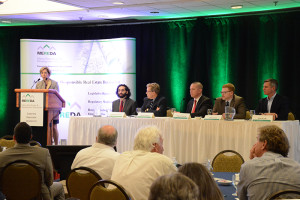MEREDA conference offers big picture perspective of Why Development is Good
 The Maine Real Estate & Development Association (MEREDA), the state’s leading organization advocating for responsible real estate development, convened a conference last month entitled, “Yes-In-My-Backyard: Why Development is Good.”
The Maine Real Estate & Development Association (MEREDA), the state’s leading organization advocating for responsible real estate development, convened a conference last month entitled, “Yes-In-My-Backyard: Why Development is Good.”
“Renewed interest in Maine’s cities and downtowns have placed pressure on communities to build in unprecedented ways. Recognizing the crippling effect of NIMBY, or ‘not in my backyard,’ ways of thinking,” said MEREDA president Paul Peck in announcing the event. “The ‘yes in my backyard,’ or ‘YIMBY,’ movement is an overt counterargument to oppositional mindsets – and is gaining traction quickly.”
Jesse Kanson-Benanav, a Boston area YIMBY pioneer keynoted the conference. He is an instrumental leader in the movement, and set the stage for a discussion about how to move development forward, with an update on the present status of pro-growth efforts and implications for the future of communities.
Kanson-Benanav asserted that development:
– Moderates and/or stabilize housing prices,
– Increases economic stability, and
– Improves the general diversity of communities, both from a social and economic perspective.
He came armed with real-world, pro-density examples. For instance, household size is decreasing across the globe, with families choosing to have fewer children and with less multigenerational living situations. In the U.S., in 1950, the average household was 3.37 people. Now it’s 2.6. Even if populations don’t grow overall, the amount of housing needed in any given community to accommodate the same number of residents is growing year-over-year.
“When you build at lower densities, you have to take farms and open spaces and turn them into lots,” he continued, suggesting that density is better for social integration and better for the environment. “Suburban expansion combined with large lots leads to exclusionary land use practices, with fewer people and increased pricing.”
Local experts augmented the conversation. James Brady, visionary of the Press Hotel and the Portland Company redevelopment in the East End, Jeff Levine of the City of Portland, Dana Totman of Avesta Housing, and Patrick Venne of Redwood Development Consulting each spoke about their local experiences, as part of a panel moderated by Elizabeth Boepple of BCM Environmental & Land Law.
Venne provided real-world examples of how convening community conversations and cultivating stakeholder questions and support is worthwhile, even before filing an application with the local planning department. “Moderating the design ahead of time can be more powerful,” he said.
Totman advocated that planning boards and planning departments take a more proactive approach to updating zoning ordinances, suggesting that those folks are the subject matter experts, but that a slow reaction to trends or best practices can mean that the city council or other entity is forced to interfere.
Levine honed in on the evergreen issue of parking, which is almost always controversial when any development is proposed. He said, when a developer gets “a curb cut, you basically take two public parking spaces and privatize them,” and therefore advocated that municipal entities relax minimums and let market decide. “Planners are libertarians when it comes to parking,” he concluded.
Some of the discussion was tactical in nature, for instance the interplay between a municipal comprehensive plan and zoning codes, while other conversation will double-down on the role of development vis-a-vis school funding models, local employment opportunities, and other quality of life benefits.
“Our goal was to offer a big picture perspective of how development is good for our collective future, and the rationale around smart growth development,” said Brian Curley, president of PDT architects and vice president of MEREDA. “Attendees were armed with tools about how to get more people to think globally about development, and what it means for the real estate industry more broadly.”
All presentations can be downloaded at: http://www.mereda.org/eventdetail.php?ID=701.
For more information about MEREDA and upcoming events, visit MEREDA.org.
